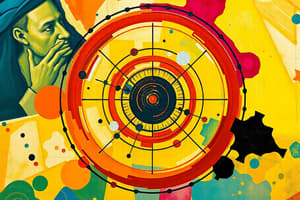Podcast
Questions and Answers
Who formulated the Heliocentric Model of the universe?
Who formulated the Heliocentric Model of the universe?
Nicolaus Copernicus
What was the predominant belief about the Solar System before the Copernican Revolution?
What was the predominant belief about the Solar System before the Copernican Revolution?
- Darwinian Model
- Ptolemaic Model
- Heliocentric Model
- Geocentric Model (correct)
Who is credited for the treatise 'On the Origin of Species', published in 1859? Charles ____.
Who is credited for the treatise 'On the Origin of Species', published in 1859? Charles ____.
Darwin
The Copernican Revolution marked the beginning of enlightened astronomy.
The Copernican Revolution marked the beginning of enlightened astronomy.
Match the following individuals with the intellectual revolutions they were associated with:
Match the following individuals with the intellectual revolutions they were associated with:
What was the primary contribution of the Copernican Revolution to scientific thinking?
What was the primary contribution of the Copernican Revolution to scientific thinking?
Which of the following best describes the two-stage process of scientific revolution, according to Jean Sylvian Bailley?
Which of the following best describes the two-stage process of scientific revolution, according to Jean Sylvian Bailley?
What was the title of Copernicus' formalized published article about the heliocentric model?
What was the title of Copernicus' formalized published article about the heliocentric model?
Which of the following was NOT a characteristic of the Geocentric Model?
Which of the following was NOT a characteristic of the Geocentric Model?
What was the primary purpose of Copernicus' Commentariolus?
What was the primary purpose of Copernicus' Commentariolus?
Which intellectual revolution is associated with the concept of evolution through natural selection?
Which intellectual revolution is associated with the concept of evolution through natural selection?
What was the significance of the heliocentric model in the development of modern science?
What was the significance of the heliocentric model in the development of modern science?
What was the profession of Jean Sylvian Bailley?
What was the profession of Jean Sylvian Bailley?
What was the significance of the Copernican Revolution in the study of cosmology and astronomy?
What was the significance of the Copernican Revolution in the study of cosmology and astronomy?
Who is credited with stirring an intellectual revolution in the mid-19th century?
Who is credited with stirring an intellectual revolution in the mid-19th century?
What is the process by which organisms, including humans, inherit, develop, and adapt traits that favored survival and reproduction?
What is the process by which organisms, including humans, inherit, develop, and adapt traits that favored survival and reproduction?
What was one of the contributions of the Darwinian Revolution?
What was one of the contributions of the Darwinian Revolution?
Who is credited with stirring a 20th-century intellectual revolution?
Who is credited with stirring a 20th-century intellectual revolution?
What is the scientific method of understanding inner and unconscious conflicts embedded within one's personality?
What is the scientific method of understanding inner and unconscious conflicts embedded within one's personality?
What was a controversy surrounding Psychoanalysis?
What was a controversy surrounding Psychoanalysis?
What is the significance of the Freudian Revolution?
What is the significance of the Freudian Revolution?
Flashcards are hidden until you start studying
Study Notes
Intellectual Revolutions
- An intellectual revolution refers to a series of events that led to the emergence of modern science and the progress of scientific thinking across critical periods in history.
Copernican Revolution
- The Copernican Revolution was a paradigm shift in the 16th century, introduced by Nicolaus Copernicus, a Polish mathematician and astronomer.
- Copernicus formulated the Heliocentric Model (Sun-centered Solar System) of the universe, which replaced the Geocentric Model (Earth-centered Solar System) of Ptolemy.
- In his model, Copernicus repositioned the Earth from the center of the Solar System and introduced the idea that the Earth rotates on its own axis.
- The Copernican Revolution served as a catalyst to sway scientific thinking away from age-long views about the position of the Earth relative to an enlightened understanding of the universe.
- It marked the beginning of enlightened astronomy and contributed to the recognition of heliocentrism.
Darwinian Revolution
- The Darwinian Revolution was an intellectual revolution in the mid-19th century, stirred by Charles Darwin, an English naturalist, geologist, and biologist.
- Darwin's treatise on the science of evolution, On the Origin of Species, was published in 1859 and introduced the concept of natural selection.
- Natural selection is an evolutionary process by which organisms, including humans, inherit, develop, and adapt traits that favored survival and reproduction.
- The Darwinian Revolution demonstrated the power of the laws of nature in explaining biological phenomena of survival and reproduction.
- It showed that the development of organisms and the origin of unique forms of life and humanity could be explained by a lawful system or an orderly process of change underpinned by laws of nature.
Freudian Revolution
- The Freudian Revolution was an intellectual revolution in the 20th century, stirred by Sigmund Freud, an Austrian neurologist.
- Freud introduced psychoanalysis, a scientific method of understanding inner and unconscious conflicts embedded within one's personality.
- Psychoanalysis emphasized the existence of the unconscious where feelings, thoughts, urges, emotions, and memories are contained outside of one's conscious mind.
- Freud's psychoanalysis is widely credited for dominating psychotherapeutic practice in the early 20th century.
- Psychodynamic therapies that treat a myriad of psychological disorders still remain largely informed by Freud's work on psychoanalysis.
Intellectual Revolutions
- Refer to the series of events that led to the emergence of modern science and the progress of scientific thinking across critical periods in history.
Three Most Important Intellectual Revolutions
- Copernican Revolution
- Darwinian Revolution
- Freudian Revolution
Copernican Revolution
- A paradigm shift in the 16th century, formulated by Nicolaus Copernicus, a Polish mathematician and astronomer.
- Introduced the Heliocentric Model (Sun-centered Solar System) of the universe, replacing the Geocentric Model (Earth-centered Solar System) of Ptolemy.
- Published "De Revolutionibus Orbium Coelestium" (The Revolution of Celestial Spheres) in 1543, formalizing the heliocentric model.
- Repositioned the Earth from the center of the Solar System and introduced the idea that the Earth rotates on its own axis.
- Contributions:
- Served as a catalyst to change scientific thinking away from age-old views about the position of the Earth.
- Marked the beginning of enlightened astronomy.
- The heliocentric model eventually caught on among other astronomers, leading to the recognition of heliocentrism.
- Marked a turning point in the study of cosmology and astronomy.
Darwinian Revolution
- Stirred by Charles Darwin, an English naturalist, geologist, and biologist, in the mid-19th century.
- Published "On the Origin of Species" in 1859, introducing the concept of natural selection.
- Natural Selection:
- An evolutionary process by which organisms, including humans, inherit, develop, and adapt traits that favor survival and reproduction.
- Traits are manifested in offspring that are more fit and well-suited to the challenges of survival and reproduction.
- Contributions:
- Demonstrated the power of the laws of nature in explaining biological phenomena of survival and reproduction.
- Developed the concept of the origin of unique forms of life and humanity through a lawful system or an orderly process of change underpinned by laws of nature.
Freudian Revolution
- Stirred by Sigmund Freud, an Austrian neurologist, in the 20th century.
- Introduced psychoanalysis, a scientific method of understanding inner and unconscious conflicts embedded within one's personality.
- Psychoanalysis:
- Emerged from free associations, dreams, and fantasies of the individual.
- Emphasized the existence of the unconscious, where feelings, thoughts, urges, emotions, and memories are contained outside of one's conscious mind.
Studying That Suits You
Use AI to generate personalized quizzes and flashcards to suit your learning preferences.




